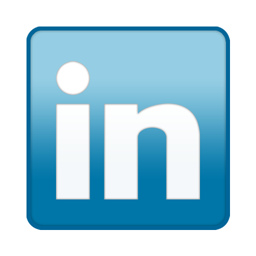 I was prompted to write this post in response to a comment on an earlier blog post found both here and at CareerHubBlog:
I was prompted to write this post in response to a comment on an earlier blog post found both here and at CareerHubBlog:
7 Key Ways to Use Social Media in Your Job Search
Rory says:
![]() 888-737-3963
888-737-3963
Posted by Tyrone Norwood
Mar 16, 2013 7:59:00 AM
 I was prompted to write this post in response to a comment on an earlier blog post found both here and at CareerHubBlog:
I was prompted to write this post in response to a comment on an earlier blog post found both here and at CareerHubBlog:
7 Key Ways to Use Social Media in Your Job Search
Rory says:
Topics: job search, networking, recruiters, LinkedIn for job search

I just had to write a quick post to let you all know about an intriguing trick interview question and the trick to answering it!
I was talking to an IT Director who said that he was asked this question when he was applying, earlier in his career, for a position managing a Help Desk. He was offered the job on the basis of his answer. The hiring authority told him other candidates failed to answer this question in a way that would convince him that they had an innate sense of customer service - that is, a natural tendency to deliver top-notch answers, support, and solutions.
How did my client answer?
"What kind?"
A brilliant answer that showed that his first instinct was to determine the needs of the customer. Other people may have answered: "Yes, I know how to bake a cake," or "If I have a recipe," or "Only if I have the ingredients," or "I'm not that good at baking cakes."
Companies use so-called "trick" questions to uncover qualities in a candidate that straightforward interview questions cannot. Candidates are pretty savvy as to what the interviewer is looking for when asking a question. Questions like the one my client was asked is less easy to "game."
So, how can you be prepared to answer a question that seems to come out of left field? Take a minute to think before you answer. It's OK to do that, even to ask, "Please give me a minute." Consider what core skills are required by the job. How does the question relate? Is it analogous to what you would be doing on the job? What answer could you give that would translate over to the job in question?
This tip may help - or not. Giving the right answer also may not indicate who is best for the job. I can imagine a person who gives the right answer to a trick question might be someone who has a particularly "creative divergent" thinking style, rather than someone with the core skill supposedly being tested.
But if you take a minute, you may be able to "psyche out" the real question behind the question!
PS I can bake a chocolate cake. But only with a recipe and the right ingredients. I'm not so good at white cakes. Why would you want a cake? What's that have to do with anything. I love cake! JC
Topics: job search, interview questions, trick interview questions
Posted by Tyrone Norwood
Jan 29, 2013 10:16:00 AM
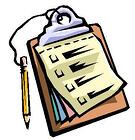
The CareerXroads Source of Hire Survey for 2012 surveyed mid- to large-sized companies hiring for $150k-$300k jobs. 36 competitive firms responded with 2,139 total jobs filled. The results suggest some interesting directions for executives in job search mode to go. Here is some of the data, followed by implications for your job search and other job search best practices.
Stay tuned for the 2013 survey which we will bring you up to date on when it comes in - and good luck!
Topics: job search, source of hire survey, how people get jobs
Posted by Tyrone Norwood
Jan 7, 2013 7:50:00 AM
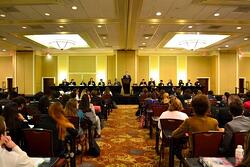
Conferences can be goldmines for executives involved in a confidental job search. Here are 10 tips:
1. Do NOT ask about positions or do anything else close to looking for a job. Being paid to rep your company, you have to strictly observe your charge, loyalty to your company.
2. DO collect relationships lavishly - business cards from everyone - but, also, make an attempt to make a real connection so that you are memorable - use your brand "The strategic cloud computing expert with a business focus." Any non-work connections/interests will help you be memorable as well.
3. Offer to help new contacts in any way that you can - including connecting them with people you know to help them with their job transitions, if they ask about that.
4. When you get home, invite all the people on your business cards to connect on LinkedIn - also follow them on Twitter.
5. Email the ones you feel you can trust with knowing about your confidential search and ask for a couple of names of people to contact at companies for which you may want to work. Be specific about position - Senior Director of IT - and size of company and industry, so that your contacts can be most helpful to you. Offer to do the same for them, either now or at any time in the future.
6. Select a trusted group of LI connections whom you want to keep updated on your job search. Send an update from LI each week or two telling them about any interesting new meetings or developments in your job search - to keep you "top of mind."
7. For all your connections, including your new conference ones, do regular LI updates - weekly or biweekly - about any (non-job search) activity at your company, your professional pursuits, etc. - again, to keep you top of mind.
8. Join LI groups where key connections belong. That includes recruiters who place IT executives!!!
9. Leverage the new contacts you've made at the conference and send out regular newsletters or links to your blog posts to them. If you don't have either now, consider either or both. They are fantastic networking vehicles.
10. Keep your new contacts alive through occasional personal emails or quick phone calls.
Networking is still the best way to get a job. Make it part of your professional life no matter whether you are in job transition or not. Contacts from conferences - because you can meet so many face-to-face - can be especially valuable, if you use the techniques above. Good luck!
Image attribution: FHSMUN 34
Topics: job search, LinkedIn, networking, conference networking
Posted by Tyrone Norwood
Nov 27, 2012 8:48:00 AM

As job search coaches, my colleagues and I are experts at helping clients plan and implement their job searches. We teach about social search (leveraging social media), Web 2.0 networking, the Direct Approach, uses of job boards, how to work with recruiters, email and direct mail campaigns etc.
The only trouble is ... sometimes the very nature of job search can cause people to feel uncertain, not in control, anxious, vulnerable, over-eager, even desperate. And these feelings tend to undermine both the activities of job search and interviewing.
To complicate matters, clients frequently are dealing with feelings related to short- or long-term unemployment or sudden termination due to company changes beyond their control (mergers, acquisitions, natural disasters like Sandy, a shift in the company's strategic priorities) or complications such as personnel conflicts or perceived non-performance.
The inevitable emotions that accompany any of these circumstances need to be acknowledged, validated and processed so that they don't creep into your voice, body language or job search effort. Talk to a friend, or get short-term counseling if you need to.
Even if you have a solid position of employment and are just looking around, you will most likely experience a degree of tension about being assessed or judged by hiring authorities or recruiters as they consider you for opportunities.
So, stress, anxiety, self-doubt are often unwelcome guests at the job search party.
This is where some radical healing is needed. This is where some simple Buddhist practices can change your stress into calmness, your anxiety into serenity, your self-doubt into confidence. Practicing the following breathing exercises as presented by Buddhist Thich Nhat Hanh can transform the way you go about your job search.
Try saying these to yourself, breathing deeply in and out, a couple of times a day as you go about your job search. Picture yourself in your mind's eye as a flower, mountain, still waters, space and as a living being and internalize the helpful feelings that accompany those pictures.
Breathing in I see myself as a flower, breathing out I feel fresh
Breathing in I see myself as a mountain, breathing out I feel solid
Breathing in I see myself as still waters, breathing out I feel calm
Breathing in I see myself as space, breathing out I feel free
Breathing in I am alive, breathing out I smile to myself
Thich says, "The best way to take care of the future is to take care of the present - that is the only thing you can do."
Try these practices and see if your job search doesn't start to feel more purposeful and skillful. You may find that you feel more serene as you go about your job search activities, secure in your own unique value in the world and focused on the things you can do in the present, knowing that they will lead to a future that will be a good one for you.
Image attribution: fastcodesign
Topics: job search, Buddhism, Zen
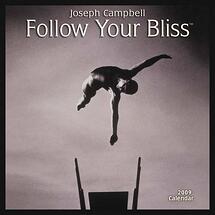
Image courtesy of lowdensitylifestyle.com
Peter Weddle - known for his authoritative work on on employment sites showcased on weddles.com - has written a novel on how three protagonists navigate the new world of work. It's called A Multitude of Hope. His thesis is that, with the demise of the corporate ladder, we are on the verge of a work renaissance, where talent and continuous learning and training are the determinants of career success. While being interviewed by coaching pioneer Susan Whitcomb, Peter, somewhat surprisingly, didn't repeat the common mantra of the age:
"Follow Your Bliss."
Popularized by Joseph Campbell, this is the instruction commonly given to people who are unhappy in work. Having been interested in the world of work for decades now, I have always veiwed such a proscription with a touch of skepticism. I know it works out for some. Some are able to follow their bliss and still make the money they need or adjust their lifestyle to match their new income stream.
But, for many, there is a difficult tradeoff between what they would love most to do all day and the job that will bring them in enough money. So, what did Peter say? He said that your work should be at the intersection of your talent and practicality.
Although talent isn't identical to what you love to do, the concept is the same: for work, find a situation where you can use the particular subset of your talents and/or bliss activities and also get paid what you need (your assessment). Also, find a job that provides you with the challenges and opportunities for growth that will maintain and sustain you over time.
Take the musician who works in Whole Foods' award-winning cheese department during the day, but plays the gigs she loves to play at night and on weekends. She also loves cheese and relating to people. So her day job pays for her first bliss, music. And Whole Foods is a company that provides the team-centered and customer service work she enjoys and also an opportunity to earn a wage that has the potential to inflate significantly over time, even if she doesn't progress up the ladder of promotions.
In another instance, a Director of IT has worked in the insurance industry for a decade. He loves IT, but not insurance. So he lands a job working for a charitable organization he is passionate about and where he has volunteered his time. He gets to exercise his leadership and IT talents, follow his bliss, and make the money he needs, even though compensation is less than in insurance.
This issue comes up a lot in career branding and personal branding, areas that I work in. It's critical, in helping my executive clients to get their next great job, to find the sweet spot where their personal brand and their career brand and requirements live.
Peter Weddle's book promises a lot of very interesting ideas about the world of work. This is just one of them. How have you found a way to strike a balance between your talents, your bliss, and your need for practical rewards?
Image courtesy of lowdensitylifestyle.com
Topics: job search, personal branding, career management, follow your bliss
Posted by Tyrone Norwood
Sep 5, 2012 7:28:00 AM
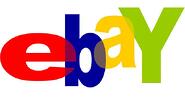
A few weeks ago I opened an eBay store and became an eBay seller for the first time. This is a sideline to my regular business, a way to indulge my avocation. It has been a very steep learning curve for me - how to set up a store, how to list and upload images, how to take good photos, how to source and price products, identify vendors, and engage with buyers, etc.
But I can tell you that in just a few short weeks I can see that the level of customer service you provide is everything on eBay. Here is the reason why it's important to provide exceptional customer service as a seller:
If you don't, your seller rating - number of stars and percentage of satisfied customers - goes down and people may not be willing to buy from you. Your rating is very obvious and a key reason why customers decide to trust you. People with Top Seller status, dependent on their rating, in part, get more traffic and can charge higher prices, because their service is known to be trustworthy.These are some ways that can help you get a good rating on eBay:
With eBay, you learn that it is critical to respond to customers POSITIVELY, VERY FAST, AND EVERY SINGLE TIME. I am struck with the almost-pleading requests many Top Sellers and others make to prospects/buyers below their product description. It goes something like this: "Please, if there is anything you don't like about the product, the shipping, or our communications, tell me first so that I can fix it. Do not just give me a negative rating. Let me make it right. Customer service is VERY important to me."
With your very livelihood at stake, you have to prioritize customer service as a critical value on eBay. So what does this have to do with job search? If you interact with your social networks, LinkedIn, your contacts at companies, interviewers, recruiters etc. with the level of customer service eBay conditions you to, you will be noticed, you will be remembered. How do you do this?
1. Respond to email and phone messages FAST.
2. Send out thank-you notes or emails IMMEDIATELY.
3. Communicate REGULARLY, CONSISTENTLY, AND POSITIVELY.
4. GO OUT OF YOUR WAY to meet the needs of the other.
5. Do your work and engage with other to a STANDARD OF EXCELLENCE.
6. Do 1-5 EVERY SINGLE TIME.
So customer service in your job search shouldn't be just one aspect of the process. Make it ALMOST EVERYTHING - and see what happens. Maybe 5 stars, 100% satisfaction, and Top Seller status will translate into the job of your dreams.
Topics: job search, LinkedIn, networking, eBay, customer service
Posted by Tyrone Norwood
Aug 21, 2012 7:42:00 AM

Facebook is considering launching a job board. How you react to this information in a Forbes' blog post may well impact your success in your job search some day soon:
So, will Facebook eat LinkedIn's lunch re job search and recruitment? Never underestimate the power of the 900M-active-monthly-users Gorilla!
Can I tell you what the percentage of the time my tech exec clients say they steer away from Facebook? Approaching 99%.
Time to play catch-up ball! Already Facebook has job apps such as Glass Door and JobVite. With a new job board/aggregator, it will be a force to be reckoned with. Don't think recruiters haven't noticed the huge database that is Facebook. They have, and companies are already using Facebook to build a recruiting and employment-brand presence.
LI is still the #1 source with 89% of companies having hired people using LI. Only 26% have hired via Facebook. But those numbers may be about to change.
So get ahead of the curve. Establish a public profile on Facebook where you can post mostly professional activity. Or, if you have a personal profile that adds to your brand rather than subtracts from your hireability, begin to insert professional updates.
Being on Facebook doesn't have to be ugly! And it may well get you a job one of these days.
Topics: job search, LinkedIn, personal branding, Facebook

Has anybody told you...
You MUST have a 1-page resume. Not true! The Career Directors International survey of recruiters, HR managers, and career coaches/resume writers shows that most people care more about the quality of the material than the length of the resume.
You MUST not go over two pages. NO, see reason above.
You MUST have a QR code on your resume. NO, so far there is no indication that this practice is catching on in a big way; if you put one on your resume, only some will click through.
A video resume is the way to go. NO, with 25% saying they would not view one and 13% saying they would, don't go out of your way to make one.
You don't need to be on social media. NO, Only 27% of people said they don't or rarely use social media to check out a candidate before deciding to interview them.
So, what should job seekers do in a positive direction?
Get in gear for the new job search with these suggestions!
Topics: job search, LinkedIn, executive resume writing, executive resume, Twitter, Facebook, social search
Posted by Tyrone Norwood
Jul 13, 2012 12:03:00 PM
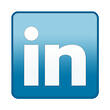
The LinkedIn Profile is now the cornerstone of your career communications. It is gradually, along with other social media sites and Google results, supplanting the resume as an introduction to you as a job candidate. For those of you who are writing your own profiles from your branded resume, I have put together 5 critical tips:
1. Your Professional Headline
- Make sure you have the title you are seeking in your Professional Headline. You can usually find the title at the top of your resume.
- If you can fit it into your allotted 120 characters, include a “reason to hire.” Your “reason to hire” is your value proposition, the value your bring to the table ($$ in revenue enabled, $$ costs cut, functionality improved, etc.)
2. Summary
- The summary is different from the profile on your resume. Keep it to no more that 3-4 short paragraphs.
- Make it less formal than your resume. Use your own “voice” to express your career brand* and your personal brand**.
- Present a quick overview of your career, particularly the last 8 years. Avoid going into detail.
- Include the top accomplishments – if possible, in terms of dollars or percentages.
- Let your personal brand shine through.
3. Skills & Expertise
- Populate your “Skills & Expertise” section with the keywords appropriate to your job target. These are often the same as the skills list that is part of your resume profile.
- Build these keywords into the Summary in a natural way as much as you are able.
4. Experience
- You want the information under the workplaces to be shorter than in your resume.
- Select your most standout contributions. You will find them standing out in your resume. Write them up using bullets.
- Include a brief snapshot of “Scope” – Number of reports, budgets managed, chief areas of accountability, etc.
5. Recommendations
- Get recommendations from people you work with or have worked with: bosses, reports, colleagues, vendors etc.
- Give them some ideas about what to write. Get these from your resume. Anything they can say that will reinforce your brand or one/many of your accomplishments will make your profile even stronger.
* Your Career Brand & **Personal Brand
- Your career brand has to do with your position (title, function, industry) and what you uniquely bring to the table (value proposition).
- Your personal brand has to do with the qualities of your personality, character, and style that are part of what make you successful.
Character Limits
Headline: 120 Chars
Company name: 100 Chars
Summary: 2000 Chars
Skills: 25 skills up to 61 Chars each
Position Title: 100 Chars
Position Description 200 Chars minimum, 2000 max
Interests: 1000 Chars
Topics: job search, personal branding, career brand, branded executive resume, resume writing, LinkedIn Profile Writing
What's new in high tech resumes, executive resumes, cover letters, job search, and personal branding for executives in technology.
"Thanks for sharing this, Jean. You make some good points - particularly as it concerns the value of a site like LinkedIn in the application process.
In all my years recruiting I've only had one candidate reach out to me on the site (and not even for a position I was sourcing), but I was so impressed that I went out of my way to get the recruiter actually handing the job to give the candidate a phone screen."
Amazingly, some of the simplest tactics can pack the biggest punch when it comes to job search. Going into your target company's Facebook page and clicking "Like" is one. Rory, the recruiter I quote above, confirms that reaching out through LinkedIn can work well.
Here's how to do it:
Find a way to connect with the recruiter working for the company (or, in Rory's case, any recruiter in the group). You can do this by reaching out through your first or second degree connections or using one of your Inmails (~$10/connect). Or, if you aren't connected, join a group that the recruiter is in (see Groups lower down in their profile). That will enable you to connect with another member of the group.
What do you say when you connect? That you saw the job posting and wanted to reach out directly. State your value proposition for that position and add a comment about something unique to that company - a challenge they are experiencing you can help with, for instance, an acquisition, new product line, expansion, new contract etc. Tie that challenge to your experience. Ask if they would be free to talk for 5 or 10 minutes about how your specific experience could help the company with the current challenge. Thank them and give them a phone number and email where you can be reached. Always have a professional voicemail message.
What if you can't find the recruiter or hiring authority on LinkedIn? Go to the company search bar and type in the name of the company. For many companies, employees who are on LI will be shown. Is there someone there who can connect with your target person because they are in the same dept, do a similar job, or are in the same location? Ask if they would like to talk for a few minutes about the company's culture and what it's like to work there - because you are interested in the company. If, when you are talking, the occasion arises for you to say you would like to submit a resume for a posted job, would they hand it to the hiring manager, all the better.
What if you can't find the recruiter or hiring authority on LinkedIn or don't have the name? Try a general Google search on the company name. Or go to Manta.com and find the company - they will often have officers of the company listed.
The short of it? LinkedIn offers a number of ways in - take advantage of all of them - become a LinkedIn athlete!
PS Taking non-obvious routes to get noticed in your job search are worth taking the time for. Another is to send a US Mail letter (no resume) directly to the hiring authority for the particular job. Do it overnight delivery and it will get opened.